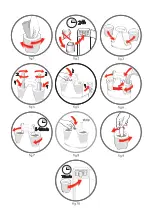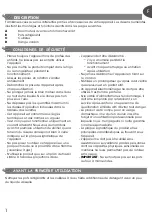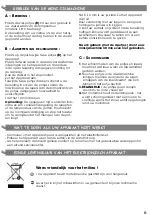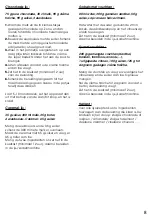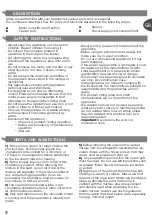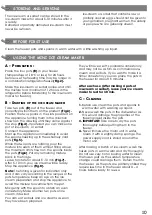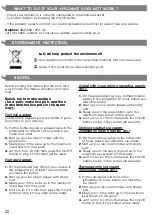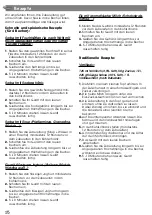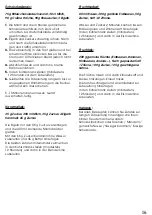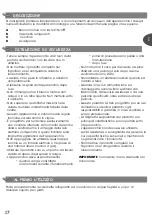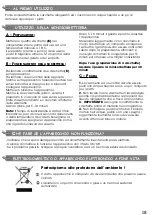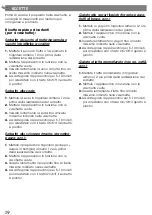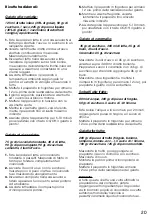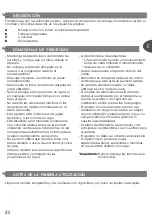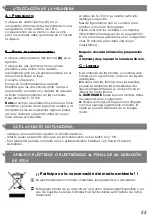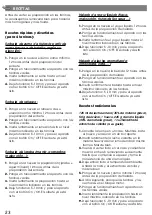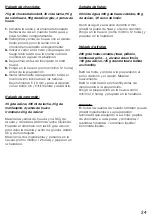
9
DESCRIPTION
A
Motor unit with on/off button
B
Freezer pots
SAFETY INSTRUCTIONS
- Always keep the appliance out of reach of
children. Prevent children from using it.
- Do not put the complete product in
operation in the fridge or the freezer.
- Let rotating parts come to a complete stop.
- Disconnect the appliance’s plug after each
use.
- Do not immerse the motor unit in water or any
other liquid. Do not rinse it under running
water.
- Do not exceed the maximum quantities or
the operation times stated in the recipes or
instructions.
- This appliance complies with applicable
technical rules and standards.
- It is designed to run only on alternating
current. Please check before first use that the
mains power supply corresponds to that
indicated on the appliance's rating plate.
- Do not place the appliance or use it on a hot
plate or close to a flame (gas cooker).
- Only use the appliance on a stable working
surface where it cannot be splashed by
water..
- Disconnect the appliance :
* if there is a problem during operation
* before each cleaning or maintenance
operation
* after use
- Never pull the power cord to disconnect the
appliance.
- Before using an extension lead, always first
make sure it is in good condition.
- Do not use a household appliance if it has
been dropped.
- If the power supply cable is damaged, it must
be replaced by the manufacturer, its after-
sales department or a person with similar
qualification to avoid any risk of danger.
- This product has been designed for domestic
use only. Any commercial cuse,
inappropriate use or failure to comply with
the instructions, the manufacturer accepts no
responsibility and the guarantee will not
apply.
- The product rating plate and main
characteristics are on the bottom of the
appliance.
- The appliance must not be used by people
whose physical, sensory or mental capacities
do not enable them to use it safely, unless
they are assisted and watched over by a
responsible adult.
- I
mportant:
Never place the pots in a
microwave oven.
Make yourself familiar with your appliance’s various parts and accessories.
The numbered drawings show the parts and functions described in the following pages.
HINTS AND SUGGESTIONS
1)
Plan your ice-cream or sorbet making the
previous day. Some recipes require the
ingredients to be chilled for a minimum of
12 hours in the refrigerator, before transferring
to the ice-cream maker for freezing
2)
Some recipes require you to make a thin
consistency custard. When returning the
mixture to the heat, do not let it boil or the
mixture will separate. If the mixture curdles at
any stage during preparation it can be
processed in a blender or food processor for
one minute, to make it smooth.
3)
The ice-cream produced will be a soft
spoonable consistency and is often not as firm
as commercial ice-cream.
4)
Only add alcohol once the ice-cream maker
is running and the preparation is already half
frozen.
GB
C
Spoons
D
Power supply cord compartment
5)
Before removing the ice-cream or sorbet
mixture from the refrigerator, assemble the ice-
cream maker with the frozen pots so that they
are as cold as possible on start up.
6)
Any preparation poured into the frozen pots
must be liquid. Do not use stiff ingredients such
as already frozen liquids to prepare ice-cream
or sorbet.
7)
Hygiene is of the utmost importance when
making ice-cream or sorbets. Make sure that
all parts of the Ice-Cream Maker are thoroughly
clean, especially the parts that come in
contact with the mixture, plus all equipment
and utensils used when preparing the ice-
cream mixture. Always use fresh ingredients
that are within their best before date, especially
for eggs, milk and cream.



